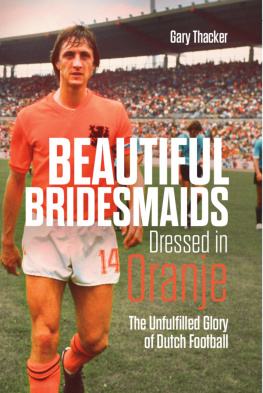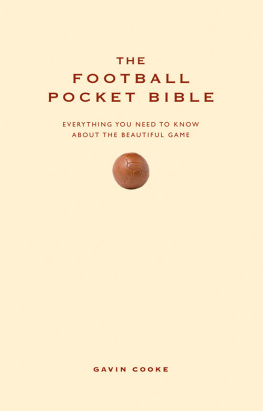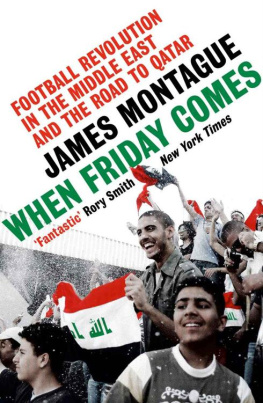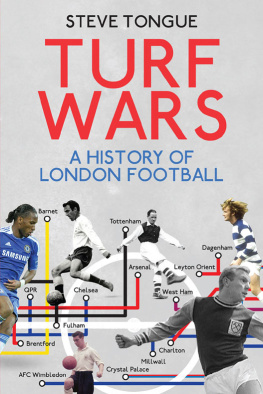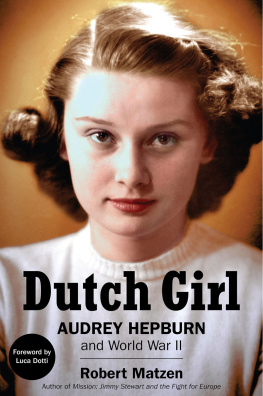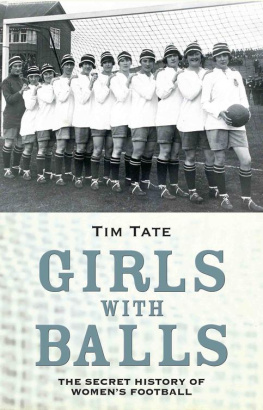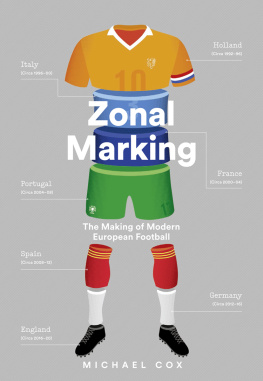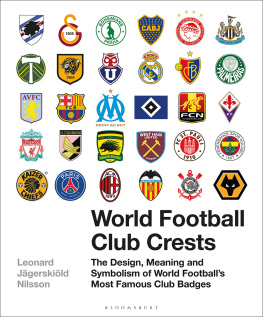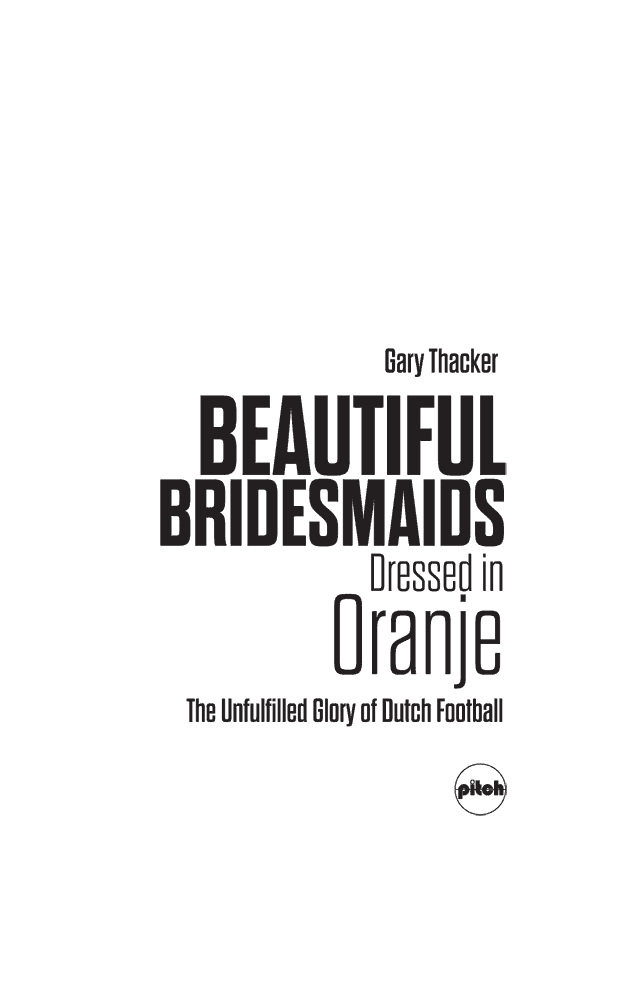First published by Pitch Publishing, 2021
Pitch Publishing
A2 Yeoman Gate
Yeoman Way
Durrington
BN13 3QZ
www.pitchpublishing.co.uk
Gary Thacker, 2021
Every effort has been made to trace the copyright.
Any oversight will be rectified in future editions at the earliest opportunity by the publisher.
All rights reserved under International and Pan-American Copyright Conventions. By payment of the required fees, you have been granted the non-exclusive, non-transferable right to access and read the text of this e-book on-screen. No part of this text may be reproduced, transmitted, downloaded, decompiled, reverse-engineered, or stored in or introduced into any information storage and retrieval system, in any form or by any means, whether electronic or mechanical, now known or hereinafter invented, without the express written permission of the Publisher.
A CIP catalogue record is available for this book from the British Library
Print ISBN 9781785318467
eBook ISBN 9781785319518
--
eBook Conversion by www.eBookPartnership.com
CONTENTS
This book is dedicated to my wife Sue, to Megan and Luke, Lydia and Gregory, to my Beautiful Princess Dolores and my gorgeous new granddaughter Polly.
It is also dedicated to all those who always supported and believed in me
You are my strength.
And to those who only ever doubted me.
You are my inspiration.
ACKNOWLEDGEMENTS
Many people have assisted in the production of this book.
The following have generously agreed to be interviewed, and allowed me to use their wise words:
Jan-Willem Bult Former player and KNVB qualified coach. International film and TV maker, football expert, initiator of Twitter @ Netherlands1974
Jan-Hermen de Bruijn Dutch football journalist, commentator and former owner and chief editor of the football magazine ELF Voetbal
Alex Frosio Gazzetta dello Sport journalist
Raphael Honigstein Author, journalist, broadcaster and presenter
Nico-Jan Hoogma KNVB (Dutch FA) director of top football.
Ray Hudson Former professional footballer, US football journalist and radio host
Graham Hunter European football journalist
Abraham Klein World Cup referee
Rob Smyth Author and Guardian journalist
Michael Statham Dutch football writer
Dr Peter Watson Teaching Fellow in the Department of Spanish, Portuguese and Latin American Studies, University of Leeds
Additionally, research for the book has been massively assisted by the following:
Stuart Horsfield
Mike Nasrallah
Steven Scragg
Aidan Williams
Finally, thanks to all at Pitch Publishing for their professionalism and dedication.
Sincere thanks to one and all.
FOREWORD
IF YOU get the opportunity to see a legend in the flesh, you do it. Back in March 1978, I was 21 years old, and since the early years of that decade had been an unashamed adherent to the doctrine of Total Football. I was seduced by the poetry of the Ajax team that dominated European club football, lifting the European Cup three times in succession.
The love deepened with the extravagant beauty, and ultimate fragility, of the bright flame of the Netherlands national team as they scorched the pitches of West Germany in the 1974 World Cup, before the fire became too fierce and their wings of wax melted. Footballs Prometheus, Icarus in Oranje.
This was no one-night stand or clumsily fumbling embrace. This was a lasting bromance. We all lock on to some paradigm of play that we believe to be the true faith. In 1978 mine was and remains that having players with skill, that are comfortable on the ball with outrageous belief and commitment, regardless of the position they play, is the baseline requirement, and then you weave those talents into the fabric of a team.
Although second in my admiration to the titan that was Barry Hulshoff when they both sported Ajaxs iconic red and white shirts, Johan Cruyff was the torch-bearer, guardian of the eternal flame kindled by Rinus Michels. By 1978, Cruyff had absconded from Amsterdam and decamped to the Camp Nou, to hook up with his old coach and reignite the passions of Barcelonas culs. Trophies had followed and, although unknown at the time, a new structure had been born that would change the club, and indeed European football, forever.
Cruyff had moved to Catalunya in 1973 and the 1977/78 season would be his last in Spain before what was almost a sabbatical year in California with Los Angeles Aztecs.
In March 1978, Barcelona had been drawn to play Aston Villa in the quarter-finals of the UEFA Cup. The Blaugrana and Cruyff were coming to the West Midlands. Living just north of Birmingham, this was my chance to go and see the great man in the flesh, to pay homage to one of the all-time great players. Was I going to miss the chance to watch the Dutch master paint some entrancing pictures in real life? Was I heck as like! Queuing for tickets was a cheap price to pay, as was the journey by foot, bus and train to get to Villa Park.
There I was in the crowd, just behind the home dugout, when Cruyff picked up the ball around halfway. With that unique style, he drove forward, swerving and gliding. Were his feet even touching the floor? Im still not sure. On he went, evading rather than beating defenders, then drove a cross-shot into the far corner of the net. I stood up and cheered, enraptured by the moment. All around me, home fans scowled at my celebration, but still applauded the goal.
The pitch was wet and hardly like the snooker-table surfaces of today, but it was the perfect stage for Cruyff. Whilst others slogged on, heavy-legged, with damp, cold and fatigue clawing at aching muscles, he was the will-o-the-wisp skating over the surface. Sometimes when you have high expectations of something anticipated, theres an almost inevitable anticlimax. Not on that night. Not with Johan Cruyff. It wasnt the Grand Canyon, but it was mightily grand.
With eight minutes or so remaining, and Barcelona two goals clear, Cruyff wearing No.9, rather than his iconic 14 limped away to the dressing-room. Although their team had been unable to cope with his majesty, the Villa fans rose and applauded him off the pitch.
For me, that was enough. Along with more than a few disappointed home fans, I turned up my collar against the cold of the Birmingham night, and headed for the exits and the long, convoluted journey home. Walking away, I heard two roars suggesting a comeback from the home team that hadnt really looked on the cards for 80-odd minutes. The game ended in a 2-2 draw. Barcelona would progress after winning the second leg 2-1, but would lose in the semi-finals to PSV Eindhoven, the eventual winners. I didnt know it then, but a beautiful dream was on the cusp of passing into a lamented past, a legacy unfulfilled.
Three months later the Dutch, this time without Cruyff, but still with much of the flair echoing from 1974, would lose another World Cup Final to the country hosting the competition. As I turned my back on Villa Park, I little knew that the football I had come to so admire was destined to perish into ashes a few months later. When it happened, I felt cheated, frustrated and annoyed that the gods of football had denied the world a celebration befitting such beguiling football. It should have been 1974. It should have been 1978, but both were denied.

